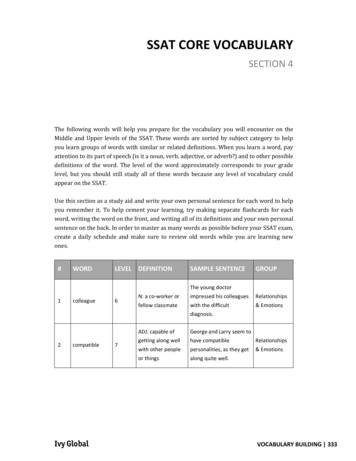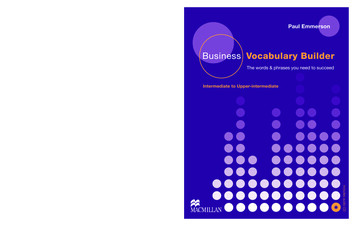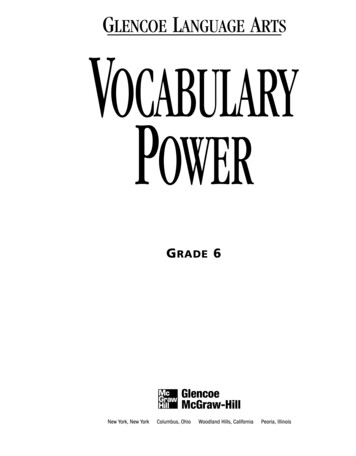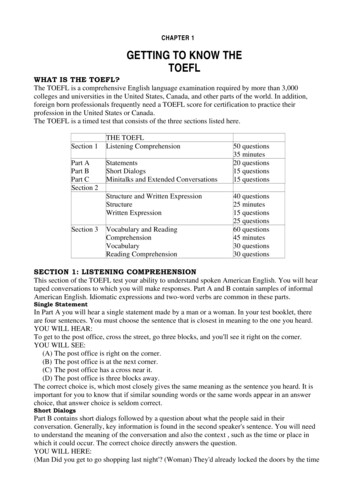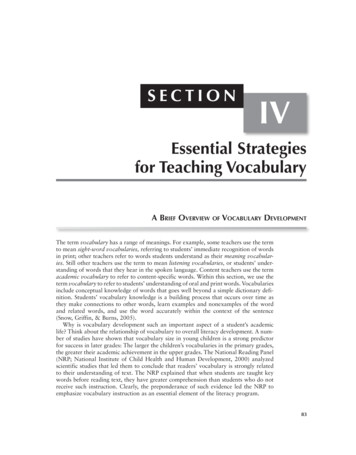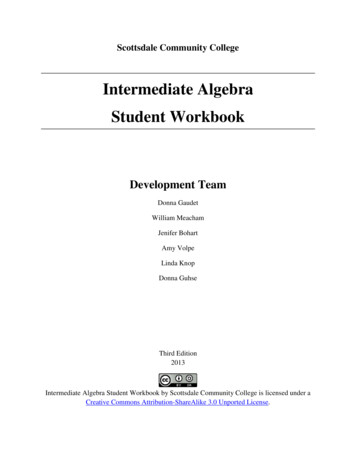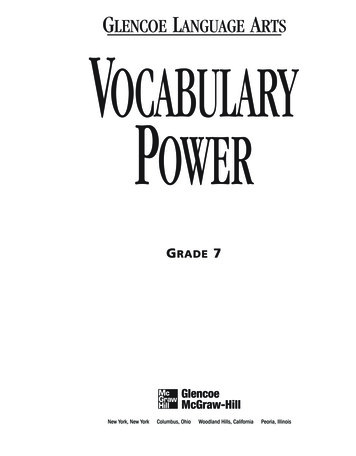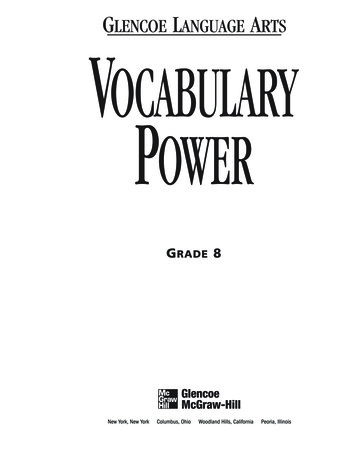
Transcription
GLENCOE LANGUAGE ARTSVOCABULARYPOWERG RADE 8
To the StudentThis Vocabulary Power workbook gives you the practice you need to expand your vocabularyand improve your ability to understand what you read. Each lesson focuses on a singlevocabulary concept or on a theme that ties together the list of words in the Word Bank. Youthen have several opportunities to learn the words by completing exercises on definitions,context clues, and word parts.You can keep track of your own progress and achievement in vocabulary study by usingthe Student Progress Chart, which appears on page v. With your teacher’s help, you can scoreyour work on any lesson or test. After you know your score, use the Scoring Scale on pagesvi–vii to figure your percentage. Then mark your score (or percentage correct) on the StudentProgress Chart. Share your Progress Chart with your parents or guardians as your teacherdirects.Glencoe/McGraw-HillCopyright by The McGraw-Hill Companies, Inc. All rights reserved. Except as permitted under the United StatesCopyright Act of 1976, no part of this publication may be reproduced or distributed in any form or means, orstored in a database or retrieval system, without the prior written permission of the publisher.Send all inquiries to:Glencoe/McGraw-Hill8787 Orion PlaceColumbus, Ohio 43240ISBN 0-07-826228-3Printed in the United States of America1 2 3 4 5 6 7 8 9 10 024 05 04 03 02 01
CONTENTSStudent Progress Chart . . . . . . . . . . . . . . . . . . . . . . . . . . . . . . . . . . . . . . . . . . . . . . . . . . . . . . .vScoring Scale . . . . . . . . . . . . . . . . . . . . . . . . . . . . . . . . . . . . . . . . . . . . . . . . . . . . . . . . . . . . . .viUnit 1Lesson 1Lesson 2Lesson 3Lesson 4Lesson 5ReviewTestUsing Synonyms . . . . . . . . . . . . . . . . . . . . . . . . . . . . . . . . . . . . . . . . . . . . . . . .1Using Synonyms . . . . . . . . . . . . . . . . . . . . . . . . . . . . . . . . . . . . . . . . . . . . . . . .3Word Parts . . . . . . . . . . . . . . . . . . . . . . . . . . . . . . . . . . . . . . . . . . . . . . . . . . . .5Word Families . . . . . . . . . . . . . . . . . . . . . . . . . . . . . . . . . . . . . . . . . . . . . . . . .7Using Reference Skills—Using a Dictionary Entry . . . . . . . . . . . . . . . . . . . . . . .9. . . . . . . . . . . . . . . . . . . . . . . . . . . . . . . . . . . . . . . . . . . . . . . . . . . . . . . . . . . .10. . . . . . . . . . . . . . . . . . . . . . . . . . . . . . . . . . . . . . . . . . . . . . . . . . . . . . . . . . . .11Unit 2Lesson 6Lesson 7Lesson 8Lesson 9ReviewTestUsing Synonyms . . . . . . . . . . . . . . . . . . . . . . . . . . . . . . . . . . . . . . . . . . . . . . .13Recognizing Base Words . . . . . . . . . . . . . . . . . . . . . . . . . . . . . . . . . . . . . . . .15Prefixes That Mean “not” or “the opposite of” . . . . . . . . . . . . . . . . . . . . . . . .17Using Reading Skills—Learning from Context: Definitions . . . . . . . . . . . . . . .19. . . . . . . . . . . . . . . . . . . . . . . . . . . . . . . . . . . . . . . . . . . . . . . . . . . . . . . . . . . .20. . . . . . . . . . . . . . . . . . . . . . . . . . . . . . . . . . . . . . . . . . . . . . . . . . . . . . . . . . . .21Copyright by The McGraw-Hill Companies, Inc.Unit 3Lesson 10Lesson 11Lesson 12Lesson 13Lesson 14ReviewTestUsing Synonyms . . . . . . . . . . . . . . . . . . . . . . . . . . . . . . . . . . . . . . . . . . . . . . .23Prefixes That Tell Where . . . . . . . . . . . . . . . . . . . . . . . . . . . . . . . . . . . . . . . . .25Greek Word Roots . . . . . . . . . . . . . . . . . . . . . . . . . . . . . . . . . . . . . . . . . . . . .27Suffixes That Form Nouns . . . . . . . . . . . . . . . . . . . . . . . . . . . . . . . . . . . . . . .29Using Reference Skills—Using a Thesaurus: Synonyms . . . . . . . . . . . . . . . . .31. . . . . . . . . . . . . . . . . . . . . . . . . . . . . . . . . . . . . . . . . . . . . . . . . . . . . . . . . . . .32. . . . . . . . . . . . . . . . . . . . . . . . . . . . . . . . . . . . . . . . . . . . . . . . . . . . . . . . . . . .33Unit 4Lesson 15Lesson 16Lesson 17Lesson 18ReviewTestUsing Synonyms . . . . . . . . . . . . . . . . . . . . . . . . . . . . . . . . . . . . . . . . . . . . . . .35Using Definitions . . . . . . . . . . . . . . . . . . . . . . . . . . . . . . . . . . . . . . . . . . . . . .37Prefixes That Tell When . . . . . . . . . . . . . . . . . . . . . . . . . . . . . . . . . . . . . . . . .39Using Reading Skills—Learning from Context: Definitions . . . . . . . . . . . . . . .41. . . . . . . . . . . . . . . . . . . . . . . . . . . . . . . . . . . . . . . . . . . . . . . . . . . . . . . . . . . .42. . . . . . . . . . . . . . . . . . . . . . . . . . . . . . . . . . . . . . . . . . . . . . . . . . . . . . . . . . . .43Unit 5Lesson 19Lesson 20Lesson 21Lesson 22Lesson 23ReviewTestUsing Context Clues . . . . . . . . . . . . . . . . . . . . . . . . . . . . . . . . . . . . . . . . . . . .45Using Synonyms . . . . . . . . . . . . . . . . . . . . . . . . . . . . . . . . . . . . . . . . . . . . . . .47Latin Word Roots . . . . . . . . . . . . . . . . . . . . . . . . . . . . . . . . . . . . . . . . . . . . . .49Suffixes That Form Adjectives . . . . . . . . . . . . . . . . . . . . . . . . . . . . . . . . . . . . .51Using Reading Skills—Learning from Context: Examples . . . . . . . . . . . . . . . .53. . . . . . . . . . . . . . . . . . . . . . . . . . . . . . . . . . . . . . . . . . . . . . . . . . . . . . . . . . . .54. . . . . . . . . . . . . . . . . . . . . . . . . . . . . . . . . . . . . . . . . . . . . . . . . . . . . . . . . . . .55
Unit 6Lesson 24Lesson 25Lesson 26Lesson 27Lesson 28ReviewTestUsing Synonyms . . . . . . . . . . . . . . . . . . . . . . . . . . . . . . . . . . . . . . . . . . . . . . .57Words from Technology . . . . . . . . . . . . . . . . . . . . . . . . . . . . . . . . . . . . . . . . .59Using Synonyms and Antonyms . . . . . . . . . . . . . . . . . . . . . . . . . . . . . . . . . . .61Number Prefixes . . . . . . . . . . . . . . . . . . . . . . . . . . . . . . . . . . . . . . . . . . . . . . .63Using Reading Skills—Using a Dictionary: Multiple-Meaning Words . . . . . . . .65. . . . . . . . . . . . . . . . . . . . . . . . . . . . . . . . . . . . . . . . . . . . . . . . . . . . . . . . . . . .66. . . . . . . . . . . . . . . . . . . . . . . . . . . . . . . . . . . . . . . . . . . . . . . . . . . . . . . . . . . .67Unit 7Lesson 29Lesson 30Lesson 31Lesson 32ReviewTestUsing Synonyms . . . . . . . . . . . . . . . . . . . . . . . . . . . . . . . . . . . . . . . . . . . . . .69Suffixes That Form Verbs . . . . . . . . . . . . . . . . . . . . . . . . . . . . . . . . . . . . . . . .71Compound Words . . . . . . . . . . . . . . . . . . . . . . . . . . . . . . . . . . . . . . . . . . . . .73Using Reading Skills—Learning from Context: Comparison and Contrast . . .75. . . . . . . . . . . . . . . . . . . . . . . . . . . . . . . . . . . . . . . . . . . . . . . . . . . . . . . . . . . .76. . . . . . . . . . . . . . . . . . . . . . . . . . . . . . . . . . . . . . . . . . . . . . . . . . . . . . . . . . . .77Unit 8Lesson 33Lesson 34Lesson 35Lesson 36ReviewTestUsing Synonyms . . . . . . . . . . . . . . . . . . . . . . . . . . . . . . . . . . . . . . . . . . . . . . .79Homophones . . . . . . . . . . . . . . . . . . . . . . . . . . . . . . . . . . . . . . . . . . . . . . . . .81Borrowed Words . . . . . . . . . . . . . . . . . . . . . . . . . . . . . . . . . . . . . . . . . . . . . .83Using Test-Taking Skills—Analogies . . . . . . . . . . . . . . . . . . . . . . . . . . . . . . . . .85. . . . . . . . . . . . . . . . . . . . . . . . . . . . . . . . . . . . . . . . . . . . . . . . . . . . . . . . . . . .86. . . . . . . . . . . . . . . . . . . . . . . . . . . . . . . . . . . . . . . . . . . . . . . . . . . . . . . . . . . .87Pronunciation Guide . . . . . . . . . . . . . . . . . . . . . . . . . . . . . . . . . . . . . . . . . . . . . . . . . . . . . . . . .89Copyright by The McGraw-Hill Companies, Inc.
STUDENT PROGRESS CHARTFill in the chart below with your scores, using the scoring scale on the next page.Name:LessonUnit ReviewUnit TestCopyright by The McGraw-Hill Companies, abulary PowerGrade 8v
SCORING SCALEUse this scale to find your score. Line up the number of items with the number correct. For example, if 15out of 16 items are correct, the score is 93.7 percent (see grayed area).Number of ItemsNumber 132.92.92.82.72.62.62.5vi Grade .764.562.560.658.857.155.65452.651.350Vocabulary PowerCopyright by The McGraw-Hill Companies, 8293031323334353637383940
Copyright by The McGraw-Hill Companies, Inc.Number of ItemsNumber 89.587.285Vocabulary Power353637383910097.2 10094.6 97.3 10092.1 94.7 97.3 10089.7 92.3 94.9 97.4 10087.5 90 92.5 95 97.540100Grade 8vii
Name Date Lesson 1Class Using SynonymsHome is a place that contains many kinds of memories—some good, some painful, some humorous,some sad. Different kinds of memories help make up our idea of home. In this lesson, you’ll learnsome words to use when you want to talk about what home means to you.Word hvalidwoehumilityperishEXERCISE ASynonymsSynonyms are words with similar meanings. Each boldfaced word below is paired with a synonymwhose meaning you probably know. Think of other words related to the synonym and write themon the line provided. Then, look up the word in a dictionary and write its meaning.1. perish : dieDictionary definition2. woe : sadnessDictionary definition3. tranquillity : peacefulnessCopyright by The McGraw-Hill Companies, Inc.Dictionary definition4. lurch : staggerDictionary definition5. hysteria : uncontrollable emotionDictionary definition6. humility : lack of prideDictionary definition7. anonymous : unknownDictionary definition8. awed : admiringDictionary definitionVocabulary PowerUnit 1, Lesson 11
Name Date Class continued9. wholesome : healthyDictionary definition10. valid : properDictionary definitionEXERCISE BSentence CompletionWrite the vocabulary word that best completes each sentence.1. Despite her impressive accomplishments, the scientist kept her attitude of .2. We were definitely the first time we visited the Capitol Building inWashington, D.C.3. “My heart is broken,” sighed the heroine of the drama, “and I know I shallbefore the sun rises.”4. Anyone who wishes to try out for the soccer team must have a(n)certificate of good health from a doctor.5. The Bosnian people suffered much in the brutal war.6. As the asteroid approached Earth, the people’s grew.7. The engine started at last and the moped began to forward.8. The person who donated 10,000 wished to remain .Copyright by The McGraw-Hill Companies, Inc.9. It’s important that the food you eat is and fresh.10. After an especially busy day, I enjoy the of lying on my bed listening tosome quiet music.2Unit 1, Lesson 1Vocabulary Power
Name Date Lesson 2Class Using SynonymsAs Dorothy learned in The Wizard of Oz, there really is no place like home. One of the reasons eachhome is unique is that each person who helps create a home is unique. The words in this lesson relateto the special place we call home.Word vemeagertauntvariedcommenceportrayEXERCISE ASynonymsEach boldfaced word below is paired with a synonym whose meaning you probably know. Thinkof other words related to the synonym and write them on the line provided. Then, look up theword in a dictionary and write its meaning.1. taunt : teaseDictionary definition2. indifference : lack of preferenceDictionary definition3. commence : beginCopyright by The McGraw-Hill Companies, Inc.Dictionary definition4. meager : thinDictionary definition5. simultaneous : at the same timeDictionary definition6. urban : cityDictionary definition7. varied : differentDictionary definition8. alliance : associationDictionary definitionVocabulary PowerUnit 1, Lesson 23
Name Date Class continued9. alternative : choiceDictionary definition10. portray : pictureDictionary definitionEXERCISE BSentence CompletionWrite the vocabulary word that best completes the sentence.1. Because the two soccer games were , we could not watch them both.2. “What time does the movie ?” Jason asked, worried about being late.3. Whether Shawna comes to the party is a matter of complete to most ofthe club members.4. The two countries formed a secret to defend each other in case of militaryattack.5. The menu choices were extremely . I found several things I wanted to order.EXERCISE CUsageAnswer the questions based on your understanding of the boldfaced word.1. Do you think a meager meal would satisfy you if you were very hungry? Why or why not?3. How would you respond if someone were to taunt you at school?4. Name a film, TV show, or book that you feel accurately portrays teenage life. Why did you choosethis particular film, TV show, or book?5. What do you feel is a good alternative to settling disputes with violence? Explain your answer.4Unit 1, Lesson 2Vocabulary PowerCopyright by The McGraw-Hill Companies, Inc.2. What are some advantages to living in an urban setting? What are some disadvantages?
Name Date Lesson 3Class Word PartsThe main meaning of a word is contained in its root or base word. Base words are roots that are complete words. Prefixes can be affixed to the beginning and suffixes to the end of the root to change itsmeaning. Knowing the meanings of word roots, prefixes, and suffixes can help you make an educatedguess about the meaning of a new word. In this lesson, you’ll identify some common roots, prefixes,and suffixes and learn how they work together to give meaning to words.Word ERCISE A Word AssociationRead the clues. Then, answer the question.1. The root of mutation comes from mutare, the Latin word for “change.” If you add the noun suffix-ion to this root, what might be the word’s meaning?2. Certain suffixes can change the part of speech of a word root. For example, -ate placed at the endCopyright by The McGraw-Hill Companies, Inc.of a root forms a verb. How would you define mutate?3. The suffix -ion makes a root a noun. To perceive is “to observe.” If you add the suffix -ion, what mightperception mean?4. Prefixes can be affixed to the beginning of roots to change their meanings. The root jour/journmeans “day.” Adding the Latin prefix ad-, meaning “to” or “toward,” creates the word adjourn,which probably means5. Some words are formed without prefixes or suffixes by combining two roots. The Greek rootanthrop/anthropo means “human being.” The root logy comes from the Greek word for “word”and now means “study” or “science.” What is anthropology?Vocabulary PowerUnit 1, Lesson 35
Name Date Class continued6. The prefix mono- means “one.” The Greek root ton means “tone” or “sound.” The suffix -ousforms an adjective. If someone’s speech is monotonous, how might you describe it?7. The Latin word for boat is navis. Adding a verb suffix to this root forms the word navigate. If theLatin prefix circum- means “around,” what might you be doing if you circumnavigate the world?8. Some words have both prefixes and suffixes added to roots. The root cede/cess comes from the Latinfor “go.” Pre- is a prefix meaning “before,” while -ence is a noun suffix. What might the wordprecedence mean?9. Another verb suffix is -ize. Our word root drama means the same as the Greek word drama, whichcomes from the word for “do” or “act.” What would you do if you were to dramatize a story?10. The root clude comes from the Latin word for “close.” The prefix se- means “apart” or “awayfrom.” If a cabin is secluded, what other words could you use to describe it?EXERCISE B6Unit 1, Lesson 3Vocabulary PowerCopyright by The McGraw-Hill Companies, Inc.Word WebsChoose a root, prefix, and suffix from those you learned about in this lesson. On a separate sheetof paper, draw three word webs like the one shown below. In the first, write the root. In the nexttwo webs, write the prefix and suffix. Fill in the “rays” with as many words as you can that containthat root, prefix, or suffix. Then, exchange webs with a partner and discuss the meanings of thewords you have listed.
Name Date Lesson 4Class Word FamiliesWord families are groups of words that contain the same roots or base words. Base words are rootsthat are complete words. The root or base word gives a word its main meaning. A prefix or suffix combined with the root or base word gives it a different meaning. In this lesson, you’ll learn words in thesame word families.Word ivelevitaterebelliousdoctrineinitiativeEXERCISE ABase Words and Word RootsLook up each boldfaced word in a dictionary and write its meaning. Then, use the information inthe dictionary entry to underline the root or base word.1. rebellious2. belligerent3. doctrine4. documentCopyright by The McGraw-Hill Companies, Inc.5. levity6. levitate7. initiative8. itinerary9. impulsive10. compelEXERCISE BSentence CompletionWrite the vocabulary word that best completes the sentence.1. Ms. Jackson said she was proud of the class for taking the in solving theproblem of litter around the school building and sports fields.2. The clowns’ performance ended the evening on a note of , very differentfrom the show’s sober beginning.Vocabulary PowerUnit 1, Lesson 47
Name Date Class continued3. The television program was about the Truman , President Harry Truman’sbelief that the United States had to oppose the Soviet Union following World War II.4. You can lead a horse to water, but you certainly can’t it to drink!5. The government soldiers had a difficult time defeating the forces in battlebecause they often disappeared into the jungle.6. “For my final trick, I shall make my assistant in the air above the audience!”announced the magician.7. You will never convince the judge unless you are able to your charges,proving that they are true.8. Will the Grand Canyon be on your for your camping trip?9. We all felt that Rebecca was when she volunteered for the committeewithout even knowing what she would have to do.10. I could tell the dog was very by the way it barked viciously at everyonewho walked by its yard.EXERCISE CAnswer each question based on your understanding of the boldfaced vocabulary word.Copyright by The McGraw-Hill Companies, Inc.1. What are some situations when levity is out of place?2. What places would be on the itinerary for your dream vacation?3. What might be a reason some people are belligerent?4. Describe the last time you did something impulsive.5. What steps would you take to document a case against a factory for polluting a nearby stream?8Unit 1, Lesson 4Vocabulary Power
Name Date Lesson 5Class Using Reference SkillsUsing a Dictionary EntryA word and the information given in a dictionary about the word is called an entry. Look at the sampleentry below.GuidewordsPronunciation spellingpreadaptation/precipitatorprecipitate (pri si’ p tāt’) v. 1. to throw violently, hurl: She addressed the difficult moralsituation into which genetic engineering has precipitated modern society. 2. to bring about:He precipitated a riot that led to the arrest of dozens of people. 3. to cause to separate from asolution: The scientist precipitated the salt from the fluid. 4. to condense from a vapor and fallas rain or snow: I hope the water in the clouds will soon precipitate as rain.eEntryDefinition(s)Sample phrase or sentenceEXERCISEUse the sample entry to answer each question.1. Which entry would you find on this page—preach, precious, or precisely?Copyright by The McGraw-Hill Companies, Inc.2. Which meaning of precipitate is being used in the following sentence?The fiery speech of the rebel leader precipitated the attack on the palace.3. On which syllable does the primary accent fall in the word precipitate?4. Use the first meaning of precipitate in a sentence of your own.5. Use the fourth meaning of precipitate in a sentence of your own.Vocabulary PowerUnit 1, Lesson 59
Name Date Class Review: Unit 1EXERCISECircle the letter of the word that best completes each sentence.1. The committee voted to the meeting until after the tornado alert had passed.a. adjournb. perishc. tauntd. lurch2. The need to rebuild some of the nation’s slums will be an important part of thecandidate’s election campaign.a. anonymousb. secludedc. urband. belligerent3. Kristin’s for Washington, D.C., included the White House, the Capitol, and the SupremeCourt Building.a. precedenceb. itineraryc. humilityd. alliance4. It’s a shame this poem is because I would love to know who wrote it.a. secludedb. anonymousc. urband. belligerent5. “The needs of my children take over every other demand on my time,” explained theemployee.a. humilityb. documentc. indifferenced. precedence6. No matter how much they Brian about his project, they cannot make him angry.a. portrayb. circumnavigate c. tauntd. compel8. Ms. Dean had to many of her successes in her application for the Master Teacher Award.a. documentb. compelc. adjournd. commence9. Watch how the opossums forward and then fall when they are pretending to be dead.a. perishb. lurchc. adjournd. levitate10. “I predict that the cells of the insect will after its exposure to radiation,” said the scientistin the film.a. adjournb. dramatizec. levitated. mutate10Unit 1 ReviewVocabulary PowerCopyright by The McGraw-Hill Companies, Inc.7. Although the businessman has been very successful, his complete lack of has mademany people dislike him.a. indifferenceb. perceptionc. humilityd. initiative
Name Date Class Test: Unit 1PART ACircle the letter of the word that best completes each sentence.1. After the Civil War, the Southern states were welcomed back into the Union.a. alternativeb. rebelliousc. variedd. simultaneous2. Do you know which actor will President Lincoln in the new film biography?a. portrayb. documentc. commenced. compel3. Although Woodbridge Middle School’s players were much taller than we were, our volleyball teamwas not by them.a. secludedb. awedc. variedd. valid4. The novelist had been asked to her most recent best-seller, Hope in the Dawn, for atelevision movie.a. adjournb. tauntc. dramatized. lurch5. I found the speeches so that I couldn’t help yawning every two minutes!a. impulsiveb. mutantc. wholesomed. monotonousCopyright by The McGraw-Hill Companies, Inc.6. Ola expressed when we asked her which ride we should go on first, so we decidedwithout her.a. humilityb. initiativec. indifferenced. tranquillity7. Because the two comments were , I couldn’t understand either one.a. simultaneous b. anonymousc. monotonousd. impulsive8. After the young children giggled during the ceremony, their parents spoke to them about theirinappropriate moment of .a. hysteriab. precedencec. humilityd. levity9. “There’s no way you can me to reveal the location of the secret meeting place,”thundered the hero to his captors.a. perishb. compelc. tauntd. commence10. The commission wrote that no to the automobile was likely to be developed over thenext twenty-five years.a. alternativeb. itineraryc. allianced. precedenceVocabulary PowerUnit 1 Test 11
Name Date Class continuedPART BFor each group of words, circle the letter of the vocabulary word that best fits.1. slim, insufficient, sparse,a. variedb. meagerc. secludedd. impulsive2. rise, float, lift,a. levitateb. portrayc. compeld. perish3. good, official, approved,a. simultaneous b. belligerentc. validd. meager4. calm, peacefulness, order,a. doctrineb. alliancec. hysteriad. tranquillity5. transformation, change, alteration,a. initiativeb. mutationc. precedenced. itineraryPART CCircle the number of the word that is most nearly the opposite of the boldfaced word.b. anonymousc. meagerd. impulsive2. happinessa. woeb. tranquillityc. humilityd. levity3. lazinessa. initiativeb. alternativec. indifferenced. levity4. identicala. monotonousb. variedc. secludedd. meager5. finisha. mutateb. tauntc. commenced. compel12Unit 1 TestCopyright by The McGraw-Hill Companies, Inc.1. thoughtfula. rebelliousVocabulary Power
Name Date Lesson 6Class Using SynonymsEven the sturdiest trees sometimes lean. We are like trees—sometimes harsh winds blow and force us to leanon other people for support. This lesson provides us with words to use when exploring the ways we dependon each other.Word persistentlyscowlvividcompetentlypostponeEXERCISE ASynonymsEach boldfaced vocabulary word below is paired with a synonym whose meaning you probablyknow. Think of other words related to the synonym and write your ideas on the line provided.Then, look up the word in a dictionary and write its meaning.1. intimate : closeDictionary definition2. scowl : frownDictionary definition3. arrogant : conceitedCopyright by The McGraw-Hill Companies, Inc.Dictionary definition
vi Grade 8 Vocabulary Power Use this scale to find your score. Line up the number of items with the number correct. For example, if 15 out of 16 items are correct, the score is 93.7 percent (see grayed area). 123 4 5 678 910111213141516 17 181920 1 100 2 50 100 3 33.3 66.7 100 4 25 50 75 100 5 20 40 60 80 100 6 16.7 33.3 50 66.7 83.3 100
